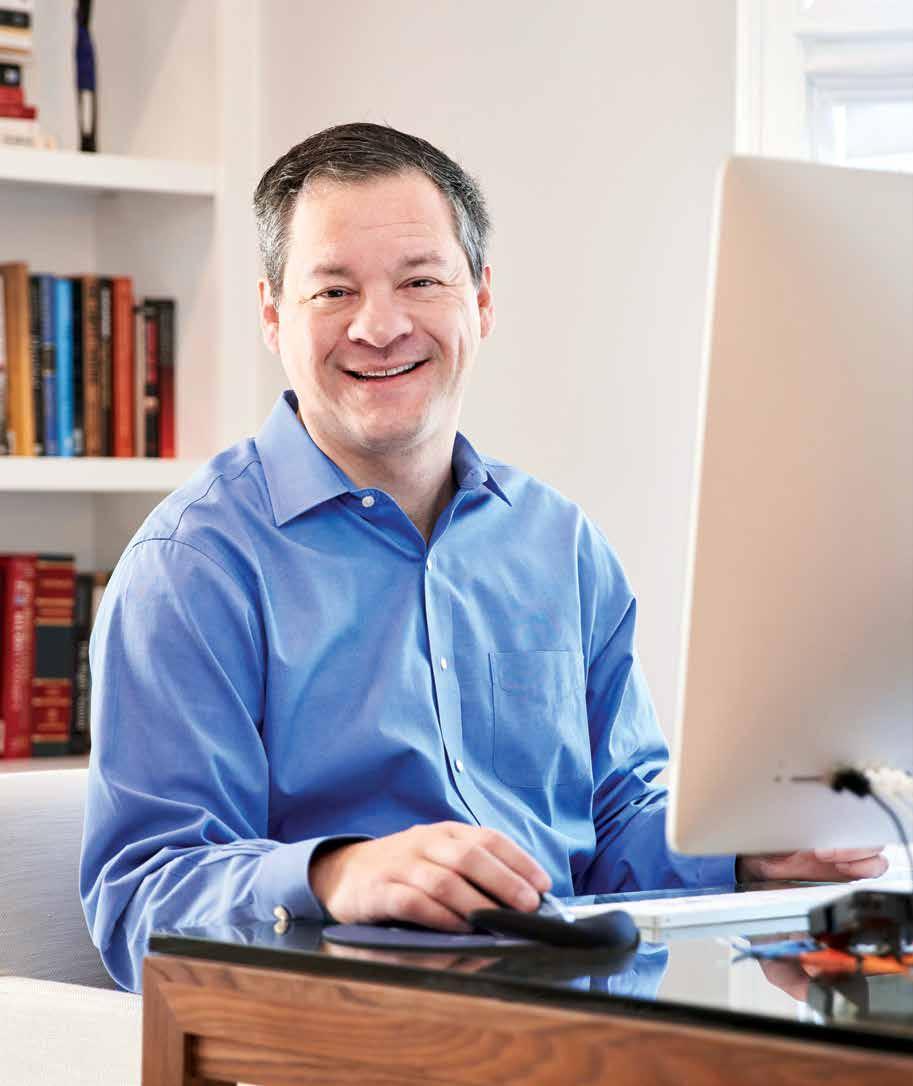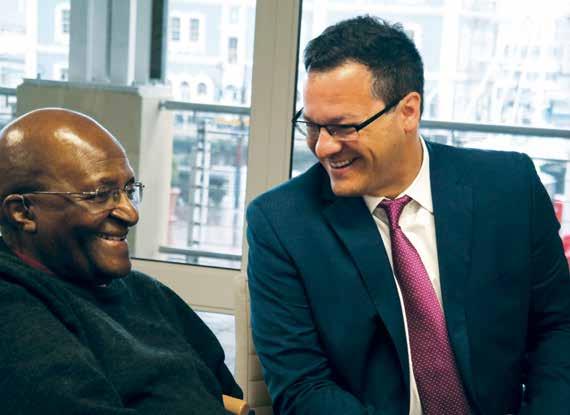
9 minute read
Alumni Profile: Jared Genser ’84
AWARDS
American Bar Association’s International Human Rights Award
Advertisement
Liberty in North Korea’s Freedom Fighter Award
Charles Bronfman Prize
Tällberg Eliasson Global Leadership Prize
TV SERIES
Jared is the co-executive producer of a television series being created for Amazon Studios that will premiere on Prime Video.
Human Rights Attorney Jared Genser ’84
If you aren’t yet aware of Jared Genser’s work as an international human rights lawyer, you will be soon. Currently, this Norwood alumnus and parent of two Norwood students (Zachary ’23 and Alexandra ’26) is working with actor and producer Orlando Bloom on a dramatic television series based on his life for Amazon Studios for Prime Video. But aside from this significant nod from Hollywood, Jared has gained prominence as an attorney and activist who has worked tirelessly and compassionately to free political prisoners all over the world. Referred to by the New York Times as “The Extractor,” Jared’s clients have included former Czech Republic President Václav Havel and Nobel Peace Prize laureates Elie Wiesel and Archbishop Desmond Tutu.
Currently, he is managing director of Perseus Strategies, special advisor on the Responsibility to Protect to the Organization of American States, and an adjunct professor of law at Georgetown University Law Center. Previously, he was a partner in the government affairs practice of DLA Piper LLP and a management consultant with McKinsey & Company. Jared is the recipient of the American Bar Association’s International Human Rights Award, Liberty in North Korea’s Freedom Fighter Award, the Charles Bronfman Prize, and Tällberg Eliasson Global Leadership Prize.
What did you want to be when you grew up?
I didn’t really know for sure, but I knew that I was interested in public service in some way or another. My mother, Lyne Taylor Genser, is a clinical social worker, and my father, Sander Genser, spent his career in the U.S. Public Health Service as a physician and spent many years working at the National Institute on Drug Abuse. I began volunteering in a soup kitchen weekly when I was in seventh grade, and I spent a lot of time engaged in community service work in high school. This led me to study public policy in college and graduate school.
What are some of your favorite Norwood memories?
Well, back then, Norwood had an annual Christmas pageant. In second grade, I was the star of the show—quite literally. I carried a pole with a star hanging off it, walking behind Mary and Joseph; that was
all a lot of fun given that I am Jewish. I also have fond memories of singing and acting in the Living History plays that were written by Jean Lutterman, Norwood’s longtime music teacher. And I remember learning the computer language Basic, too. I really loved Norwood and attended from kindergarten to sixth grade, which was as far as the School went back then.
What are your hopes and dreams for your children, Zachary and Alexandra, while they are at Norwood?
I want my children to love school, to feel challenged and supported, to embrace the diverse world that we live in and to learn a foreign language, and to have exciting experiences of all kinds, including with art and music. Norwood is doing a fabulous job with all this and more.
What do you like to do in your downtime?
I learned how to play ice hockey in college and have been playing ever since. In addition, one of the positive things coming from the pandemic for me has been that it required me to scale back my international travel and work from home. It has been wonderful to have more time at home with my wife Elaine and the kids, too.
When you were applying to law schools, did you know that you wanted to go into international human rights? What put you on that path?
I decided to go to law school after being involved in organizing what became the largest protest at Harvard since the Vietnam War. In the fall of 1997, it was announced that China’s then President Jiang Zemin was coming to speak there. I was a graduate student in public policy at the Kennedy School of Government and became one of the lead organizers of the protests. Through that work, I met some extraordinary Chinese dissidents such as Yang Jianli, who had survived Tiananmen Square and was getting his Ph.D., and Lobsang Sangay, the first Tibetan at Harvard Law School, who is today Prime Minister-in-Exile of Tibet. Although we turned out more than 5,000 protesters, as I reflected on the experience, I concluded that while this attracted global attention, it had no impact in China; the state-run media there obviously didn’t cover it. So, I went to law school to learn how to help victims of human rights abuses in China and around the world.
Jared Genser with his mentor, Archbishop Desmond Tutu.

As you reflect on your work as pro bono counsel to a number of prominent human rights activists and political prisoners, what have been the most memorable experiences for you?
I have had lots of exciting cases over my career, but some airport moments have been especially memorable. For example, early in my career, I represented a Pakistani Christian, Ayub Masih, who had a death sentence for blasphemy in Pakistan. After winning his case at the United Nations and engaging a dozen U.S. Senators to put pressure on Pakistan, the Supreme Court reversed his conviction putting his life at grave risk of harm from extremists. Our team got him to a safe house, and he then traveled days later to the U.S. on an emergency visa. Meeting him at Dulles Airport was a moment I’ll never forget. He embraced me and said, “God bless you,” which were the only words in English that he knew.
I’ve also been blessed in my life and career to have had South African Archbishop Desmond M. Tutu as one of my mentors. I first represented him pro bono back in 2005 on a major project to get the situation in Burma/Myanmar onto the agenda of the United Nations Security Council. He later became honorary cochair of Freedom Now, a non-profit group that I founded in 2001 to free political prisoners worldwide. In the many years
since, I worked with Archbishop Tutu on numerous political prisoner cases and human rights causes, and I have remained in touch with him since his retirement from public life. To get to know and work with him and so many extraordinary human rights heroes over my career has been a dream come true.
Tell us about the book you are working on with Prince Zeid Ra’ad Al Hussein?
In addition to my work as a practicing international human rights lawyer, I’ve also written or edited three books, and teach as an adjunct professor of law at Georgetown University Law Center. I worked with and became friends with Prince Zeid while he served from 2014-2018 as the United Nations High Commissioner for Human Rights, the top U.N. official focused on this work. After he completed his term as High Commissioner, we decided to work on a book together—a co-edited volume for Oxford University Press entitled The Oxford Handbook on the UN Human Rights System. Much like other Oxford handbooks, we will have about 50 expert contributors to a book that will run about 1,000 pages, the first-ever book providing a critical examination of the U.N. human rights system. Importantly, in addition to identifying major accomplishments and failures, the book will serve as a blueprint for reforming the system.
It’s very exciting—and super cool— that you are working with Orlando Bloom on a new drama series for Amazon Prime Video about your work freeing political prisoners around the world. What can you tell us about this project? Who’s playing you?
The show is about a fictionalized version of myself—a Washington lawyer who travels the world freeing political prisoners. The first season is expected to be 10 episodes. As a co-executive producer, I work with the writing team to ensure that scripts authentically capture the life-or-death stakes and the twists and turns that happen in these kinds of cases in the real world. The show will be what is referred to in the business as a “smart show”—you will be entertained by the drama and also learn a lot about the human rights heroes that are imprisoned, how they stand up to brutal dictators, and how my alter ego ultimately frees them. Think shows like West Wing, Homeland, and Tyrant. Right now, we are finishing up the pilot script, and we hope and expect that Amazon, which has had important input at every step in the process, will then move ahead with the first full season. I don’t yet know who will play me, but I will say that my character is going to be a woman with a far more interesting backstory than my own!
From the global pandemic to the situation in Afghanistan to the political divide in this country, there doesn’t seem to be a lot of positive news these days. From your perspective, can you share some heartening news about the state of our world?
In my work, I see both the worst and the best of humanity. On the one hand, I have worked globally to mobilize coalitions to prevent and respond to mass atrocity crimes such as crimes against humanity taking place in countries like Burma/ Myanmar, North Korea, and Venezuela. But on the other hand, I am repeatedly inspired by extraordinary political leaders and human rights defenders who fight both courageously and non-violently to displace dictators through democratic means and to restore human rights for their people. It is a profound honor to stand in solidarity with them. Their perseverance and willingness to risk their lives gives me great hope for the future of the world.
What advice do you have for young people determined to make a positive difference in the world?
Martin Luther King, Jr., famously said, “Everyone can be great because anybody can serve.” I didn’t start my work in public service trying to free political prisoners. I started much more narrowly as a 13-yearold volunteering in a soup kitchen once a week because I was interested in learning more about hunger and homelessness. That is really my best advice to young people: Find a problem in the world that is local and that you find interesting, and then look for opportunities where you can help. For me, my volunteering led to other experiences working with people with disabilities and in high school serving as a home hospice volunteer. That later led me to want to study public policy at a national and global level. I could never have predicted when I started where it would lead, but this journey has been a great adventure. Undoubtedly, Norwood provided me with an incredibly strong foundation on which to build.






